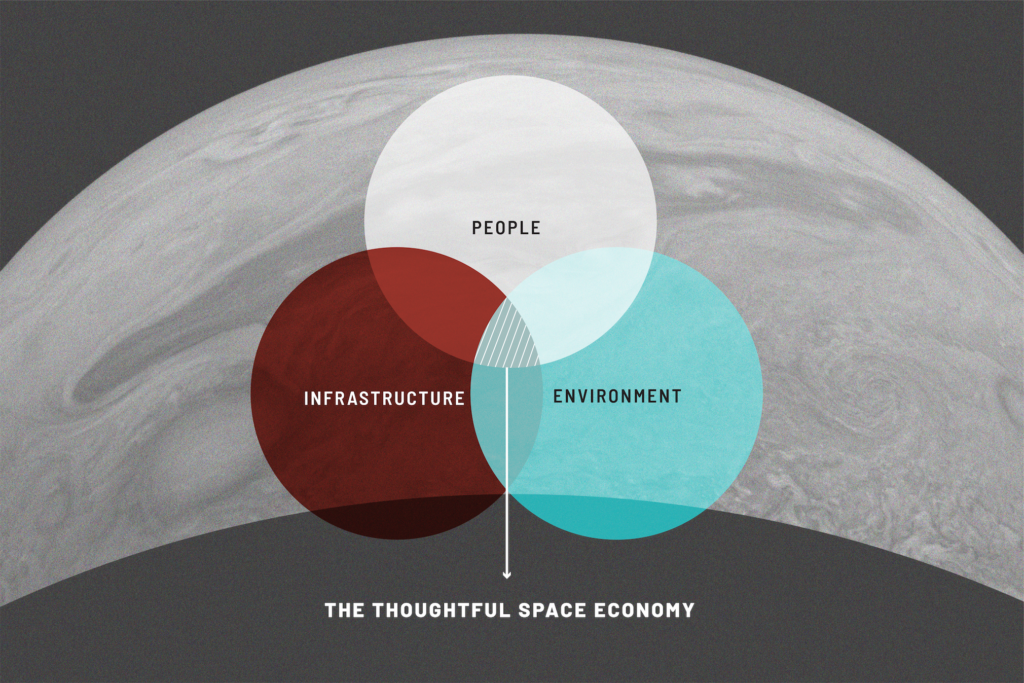The space economy’s concerns may sound familiar. How can we avoid repeating past mistakes in a new frontier?
Every industry grapples with questions related to regulation, security, diversity, talent, and ethics. The $400 billion space economy — on its way to becoming Wall Street’s next trillion-dollar investment opportunity — is no exception.
Past ages of exploration created opportunities for some, but certainly not all; innovators and pioneers haven’t always considered long-term growth or unintended consequences. At a recent Centre for Social Innovation event, Luminary Labs Engagement Managers Mahala Pagán and Claire Carlson joined Axios Space Reporter Miriam Kramer to discuss building a thoughtful space economy. By considering the connection between people, infrastructure, and environment, can we avoid the mistakes of the past and make the space economy more equitable and sustainable?
Mahala and Claire’s conversation with Miriam covered some of the developments we’ve seen in the past year since we published our initial look at the thoughtful space economy. The space economy’s concerns may be universal, but the specific questions — often ripped from recent headlines — have no obvious answers. A few familiar themes emerged.
Workforce and education. How do you prepare students for jobs that don’t yet exist? And how do you give teachers the confidence to facilitate relevant, hands-on STEM instruction if they aren’t aerospace or engineering experts? Introducing younger students to skills and projects that relate to space careers can help fill future talent pipelines; upskilling and reskilling the current workforce could help address more immediate talent needs. Without a skilled workforce, the vision of a trillion-dollar space economy will never become a reality.
Diversity and inclusion. Two NASA astronauts made history with the first all-female spacewalk in 2019, six months after originally planned; there weren’t enough properly sized spacesuits the first time around. Despite the popularity of stories like “Hidden Figures” that celebrate the contributions of African-American women, gender and racial bias is an enormous obstacle for women, people of color, and other underrepresented groups in STEM. Initiatives like the Brooke Owens Fellowship are opening up opportunities for more women to succeed in space careers, and as the space economy expands, diversity will become increasingly critical. Different perspectives contribute to better decision-making; to better understand unintended consequences, companies and governments need a more diverse workforce.
Regulation and incentives. The Outer Space Treaty, an international agreement enacted in 1967, provides principles for what nations can and cannot do in Earth orbit and beyond. But as rockets get smaller, launches get cheaper, and hardware becomes more accessible, a wide array of organizations are doing business in space, and the right levels of governance have not yet been determined. The FCC’s commercial licensing application fee is about $470,000 — sometimes more than the cost of an entire small satellite mission. Regulators are working to keep up with the speed of innovation; the trick is to enable access to space while mitigating the risk of space junk. While organizations such as OneWeb are creating their own “Responsible Space” initiatives, broader policies will be needed to prevent the next Great Pacific Garbage Patch from forming in low Earth orbit. (During the panel discussion, two defunct satellites narrowly avoided collision above Pittsburgh.) While both government and industry recognize the dangers of orbital debris, it’s unclear who will pay the bill for cleaning it up.
Data, privacy, and security. Detailed satellite imagery helps us track wildfires and monitor glacier shrinking. GPS helps us find our way around on Earth, and autonomous vehicles will rely on precise geopositioning data from satellites. But increasing use of satellites also leads to increasing concerns regarding the collection, storage, privacy, and security of data.
Infrastructure. To support technology in space, infrastructure on the ground will need to expand and improve. As much as we talk about “cloud computing,” data doesn’t live in the air — it must be stored in a physical location. Ground stations on Earth collect data from satellites, and that data is transferred through fiber optic cables. To keep satellites in orbit and functioning in space, terrestrial questions regarding data storage, ground stations, cybersecurity, and energy must be considered.
Environment. Should astronomers be allowed to build large, ground-based telescopes in places that are sacred to indigenous people? Should corporations be allowed to launch communication satellites that interfere with astronomers’ observations? What about satellite constellations that create billboards in the night sky? Should spacecrafts be allowed to carry organisms into space? And what happens when a lunar lander crashes and spills tardigrades on the surface of the Moon? Early European colonists brought diseases to the Americas; deadly epidemics devastated native societies and killed an estimated 10% of the global population. Human exploration beyond Earth could result in similar damage to the environment — and as-yet-unknown life forms.
Equity and influence. As Miriam pointed out, the first tourists in space and the first artists on Mars will be exceedingly influential. That raises questions about who has access to space travel and what their responsibilities will be to share their experiences with those left behind. Many astronauts experience a profound cognitive shift — the “overview effect” — when viewing Earth from space; finding a way to bring that same sense of global consciousness to a broader audience could go a long way toward improving life on Earth.
The space economy isn’t only a business opportunity — it’s a chance to avoid past mistakes and take a more thoughtful approach to exploration. What we do beyond Earth can also positively impact life on our home planet through development of new technologies, increased global connectivity, and even medical advancements.
We share updates and insights — including invitations to special events — in our weekly newsletter: subscribe to the Lab Report.



